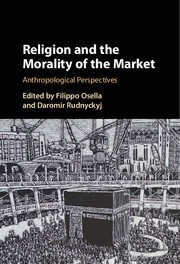Book contents
- Frontmatter
- Dedication
- Contents
- List of Figures
- List of Contributors
- Acknowledgments
- Introduction: Assembling Market and Religious Moralities
- 1 Risk, Fate, Fortune: The Lives and Times of Customs Inspectors in Southern China
- 2 Morality, Markets, and the Gospel of Prosperity
- 3 Religious Myths Retold: Masters and Servants in India's Corporate Culture
- 4 Divine Markets: Ethnographic Notes on Postnationalism and Moral Consumption in India
- 5 Merit Economies in Neoliberal Times: Halal Troubles in Contemporary Sri Lanka
- 6 “Structural Adjustment Islam” and the Religious Economy in Neoliberal Mali
- 7 Assembling Islam and Liberalism: Market Freedom and the Moral Project of Islamic Finance
- 8 Persistent Forms: Catholic Charity Homes and the Limits of Neoliberal Morality
- 9 Marketizing Piety through Charitable Work: Islamic Charities and the Islamization of Middle- Class Families in Indonesia
- 10 “A Poor Muslim Cannot Be a Good Muslim”: Islam, Charitable Giving, and Market Logic in Sri Lanka
- 11 “For God and the Country”: Agricultural Migrations and their Moralities in South India
- 12 “The Globalization of Indifference”: On Pope Francis, Migration and Global Acedia
- Index
- References
3 - Religious Myths Retold: Masters and Servants in India's Corporate Culture
Published online by Cambridge University Press: 13 April 2017
- Frontmatter
- Dedication
- Contents
- List of Figures
- List of Contributors
- Acknowledgments
- Introduction: Assembling Market and Religious Moralities
- 1 Risk, Fate, Fortune: The Lives and Times of Customs Inspectors in Southern China
- 2 Morality, Markets, and the Gospel of Prosperity
- 3 Religious Myths Retold: Masters and Servants in India's Corporate Culture
- 4 Divine Markets: Ethnographic Notes on Postnationalism and Moral Consumption in India
- 5 Merit Economies in Neoliberal Times: Halal Troubles in Contemporary Sri Lanka
- 6 “Structural Adjustment Islam” and the Religious Economy in Neoliberal Mali
- 7 Assembling Islam and Liberalism: Market Freedom and the Moral Project of Islamic Finance
- 8 Persistent Forms: Catholic Charity Homes and the Limits of Neoliberal Morality
- 9 Marketizing Piety through Charitable Work: Islamic Charities and the Islamization of Middle- Class Families in Indonesia
- 10 “A Poor Muslim Cannot Be a Good Muslim”: Islam, Charitable Giving, and Market Logic in Sri Lanka
- 11 “For God and the Country”: Agricultural Migrations and their Moralities in South India
- 12 “The Globalization of Indifference”: On Pope Francis, Migration and Global Acedia
- Index
- References
Summary
“The god of strength, Hanuman, to whom people turn to alleviate their pain and sorrows, is now also gaining importance in this world of globalisation as a management guru. Vijay Agrawal has written a book called Sada Safal Hanuman that tells us that Hanuman possesses some of the great qualities needed for management.” With these comments, the newsreader on a popular Hindi-language television channel in India drew attention to the striking new interpretation of a familiar revered figure from India's greatest Hindu epic. “Mythology was written so that it could be interpreted and used in your daily life.” This is the rationale offered by, Kishore Biyani, chairman of Future Group, India's supermarket giant, to explain why in his business practice he relies on religious myths, as interpreted by Devdutta Pattanaik, Chief Belief Officer of his company and author of several highly popular books on mythology. Works by Agrawal and Pattanaik represent a growing trend of the interplay of religious belief, management ideas and business practice in contemporary India's market economy and corporate culture. This is in keeping with a well-documented “cultural turn” in global corporate practice in recent decades, marked by a tendency to invoke religious traditions and cultural belief systems, with a view to defining moral norms and ethical standards that would shape individual conduct, institutional behaviour and organizational practice in business (Calas and Smircich 2003; Browne and Milgram 2009; Nandram and Borden 2010). The extant literature on this subject shows how existing religious and cultural ideas are pressed into the service of business and management. It is, however, insufficiently appreciated that this entanglement of cultural and market imaginaries offers radical new interpretations and seeks to create new corporate sensibilities and subjectivities, which is examined in this chapter.
It is now known that with the “cultural turn,” lessons in effective human resource management and authoritative business leadership have been drawn from cultural traditions, including Greek heroic myths, medieval legends of kingship, folkloric sagas of just rule and Islamic religious principles (Koprowski 1983; Kessler and Wong-MingJi 2009; Rudnyckyj 2010). Both the state and private corporations, in many parts of the world, have asserted the superiority, authority and authenticity of indigenous religion and culture as the inspiration for capitalist development and managerial practice.
- Type
- Chapter
- Information
- Religion and the Morality of the Market , pp. 72 - 93Publisher: Cambridge University PressPrint publication year: 2017
References
- 1
- Cited by



